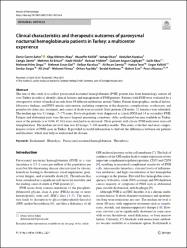Clinical characteristics and therapeutic outcomes of paroxysmal nocturnal hemoglobinuria patients in Turkey: a multicenter experience

View/
Date
2021Author
Gören Şahin, DenizAkay, Olga Meltem
Keklik, Muzaffer
Okan, Vahap
Karakuş, Abdullah
Demir, Cengiz
Erkurt, Mehmet Ali
Karakuş, Volkan
Metadata
Show full item recordCitation
Goren Sahin, D., Akay, O.M., Keklik, M. et al. Clinical characteristics and therapeutic outcomes of paroxysmal nocturnal hemoglobinuria patients in Turkey: a multicenter experience. Ann Hematol (2021). https://doi.org/10.1007/s00277-021-04554-4Abstract
The aim of this study is to collect paroxysmal nocturnal hemoglobinuria (PNH) patient data from hematology centers all over Turkey in order to identify clinical features and management of PNH patients. Patients with PNH were evaluated by a retrospective review of medical records from 19 different institutions around Turkey. Patient demographics, medical history, laboratory findings, and PNH-specific information, including symptoms at the diagnosis, complications, erythrocyte, and granulocyte clone size, treatment, and causes of death were recorded. Sixty patients (28 males, 32 females) were identified. The median age was 33 (range; 17-77) years. Forty-six patients were diagnosed as classic PNH and 14 as secondary PNH. Fatigue and abdominal pain were the most frequent presenting symptoms. After eculizumab became available in Turkey, most of the patients (n = 31/46, 67.4%) were switched to eculizumab. Three patients with classic PNH underwent stem cell transplantation. The median survival time was 42 (range; 7-183 months) months. This study is the first and most comprehensive review of PNH cases in Turkey. It provided us useful information to find out the differences between our patients and literature, which may help us understand the disease.

















